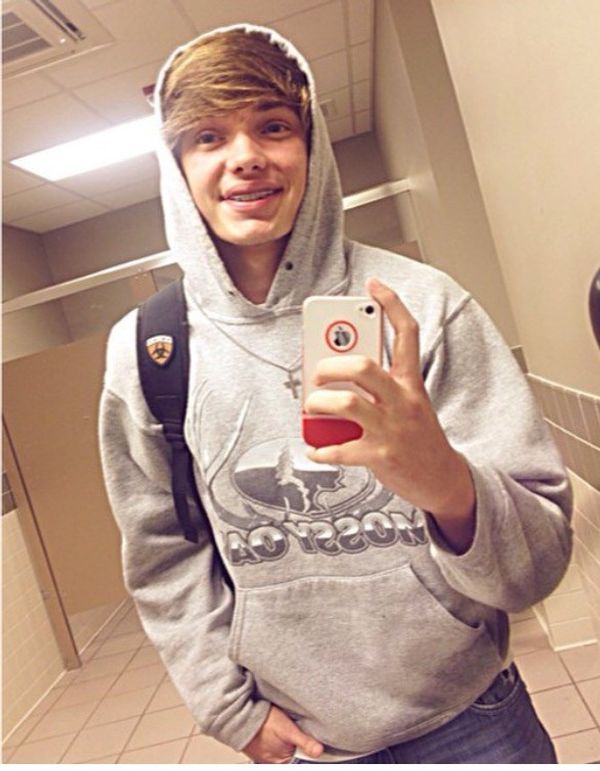"Your mother is in a better place."
I heard the words, but the funny thing is, I don't remember being there, not really. I was watching another girl's life, detached, feeling nothing. My mom had tried several times during my childhood, but no one ever thought she'd really go through with it. None of that prepared me for this.
I remember how my aunt came over, my mom's little sister, and curled up in a ball sobbing for an hour, a successful, grown woman in her 40s I had never thought I'd see shed a tear.
I remember talking to my grandparents, who had been on vacation in Hawaii, on the phone and hearing how much strength it was taking them to keep their voices steady and hold back the pain.
I remember how I kept thinking, "OK, this is when I wake up, this is where the nightmare ends."
It never did.
After my sister and I had gotten home from school on Jan. 31, 2013, we wondered why our mom's car was still in the garage because she should've been at work. The door to her bedroom was locked too. We knocked and knocked and knocked, and our dad told us to try to pick the lock, but it was no use. I had never had to call 911 in my life, and when I told the operator what was going on, I could hardly believe I was considering the possibility my mom was really dead. Surely, that was ridiculous.
It seemed like hours before the police finally arrived. I showed them upstairs, and when they finally broke the door down, I watched in horror from a chair in the hallway. The memories get jumbled after that, but I remember hearing, "Your mother is in a better place." And I remember wanting to scream, "No, she's not! This was the better place."
Reading the suicide note of a loved one is like losing them all over again, every time. You're reliving a goodbye you never even got. They're saying their last words to you but you can't respond or show them any love, and you know they died all alone.
What's funny is that, other than my mom dying, my life sort of improved in the short term. That sounds so ridiculous to people, but for such an extroverted person like me, the support of others and a sense of belonging is what makes me feel best. My teachers made very generous academic accommodations for me, my friends would invite me over for a sleepover whenever I was sad, and people were always cooking my family homemade meals. During the first few months after my mom's passing, I had a lot of pain that was almost masked by the fact that I was overwhelmed with comfort and love. I kind of forgot how to live a normal life.
Late in my sophomore year, as the comfort dissolved, I began to realize how empty I was really feeling. I started shoplifting small items from several stores, trying to fill that void with something, anything. I'm lucky that never spiraled out of control, but it was only the first gust of wind in the category five hurricane that was to follow.
Trauma doesn't usually manifest in an obvious way, and often it acts as a catalyst for mental illness issues that likely already swam beneath the surface. When I was 16, I was diagnosed with bipolar disorder after a hypomanic episode which resulted in me having to leave a choir I loved so much, followed by a deep depression which culminated in me begging my dad to take me to the hospital because I thought I might try to kill myself. By the end of my senior year of high school, I barely got out of bed, I was scared to show my face in school because I was terrified of all the horrible things that I thought might happen, and I was struggling to take my medication or eat much at all. My family decided to send me to a therapy program that summer and my graduation from high school was postponed until December. Luckily, I was able to get a medical deferral from my university, and I took a gap year.
While my recovery was in no way a linear process and is always an ongoing mission, I have seen a lot of improvement in myself since the end of high school. I considered a lot of career paths, but I could never quite talk myself out of the challenge that is going into medicine as my mom did. Often when I'm doing organic chemistry or genetics or physiology, I wish I could call my mom so she could answer all my questions. When I find a new TV show she would've liked, I have no mom to send it to. I'll have no mom when it's my turn to have children and I need advice from the person who knows motherhood best.
What I carry with me is the knowledge that even if my mom's mental illness ultimately took her life, I make a promise to myself daily that I will never go down that road. I have seen first-hand the way suicide shakes a family to its core and leaves loved ones with scars that can never truly heal. There is no lesson to be learned, or silver lining to be found, no shiny little bow to wrap this article up with. I tell my story openly and honestly because it is the only way I know how to process it, with the hope that I can show others the strength there is in vulnerability.
If you or someone you know is experiencing suicidal thoughts, call the National Suicide Prevention Hotline — 1-800-273-8255





















